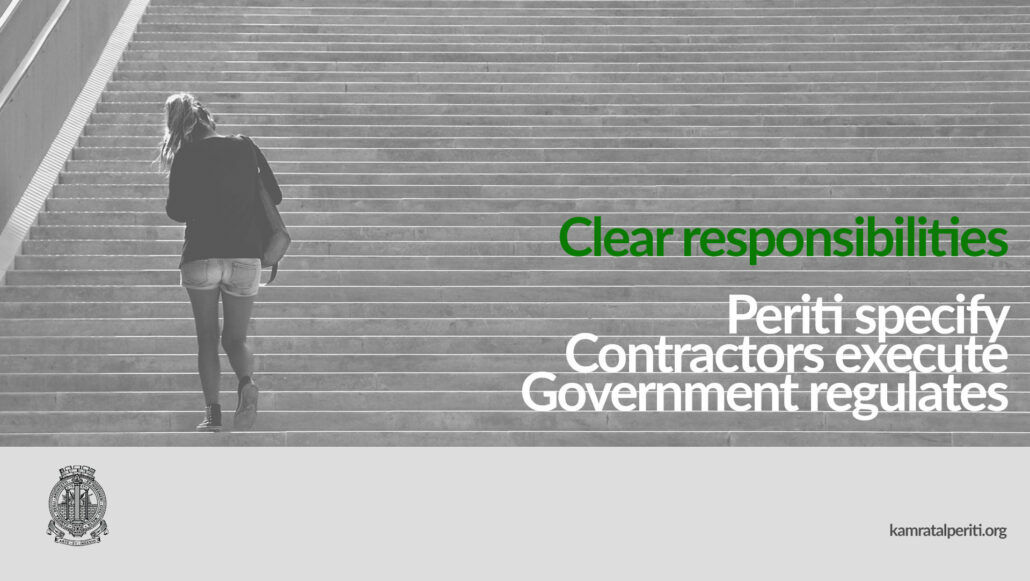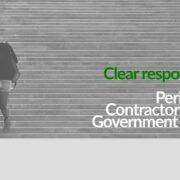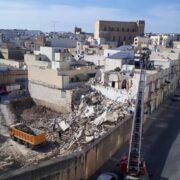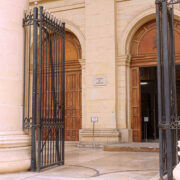PR 17/19 | Kamra tal-Periti calls for clear responsibilities in the interest of public safety
The Kamra tal-Periti notes with deep regret that L.N. 136 of 2019 Avoidance of Damage to Third Party Property Regulations, 2019, was published by Government yesterday afternoon without prior consultation with the Kamra as required by law, despite various requests for meetings over the past two weeks. The Kamra tal-Periti has again requested to meet Government after the new regulations were published to discuss its grave concerns for public safety resulting from the new regulations themselves. The questions that the Kamra sent to Minister Ian Borg yesterday remained unanswered.
The Kamra tal-Periti has consistently insisted that responsibilities should be clearly and unambiguously defined in the interest of public safety. The Civil Code specifically identifies two figures who should carry such responsibility: the perit and the contractor. Any regulation that purports to contradict the Civil Code is only contributing to the confusion that has characterised the industry in the last decades.
The responsibilities in the Civil Code are clear.
The perit is responsible to design, specify and direct the works to ensure that the building is safe. The contractor is responsible for executing the works, including following the design, specification and direction of the perit. It is up to the contractor to decide the composition and qualifications of his personnel to fulfil his responsibilities. This is the norm in developed countries.
The Kamra believes there is a third responsibility that needs to be borne, and that is the responsibility to regulate. This responsibility can only be borne by Government. To date, Government has failed to fulfil its duty to regulate the industry adequately, as discussed below.
- The BRO was left severely underfunded for years, with a meagre annual capital budget of €150,000, which is barely equivalent to the salary of six of its employees, rendering it effectively powerless and ineffective.
- The BRO has not put in place a system for registration and licensing of contractors in breach of Article 5 of the Building Regulation Act. This exposes the public to inordinate levels of risk.
- The list of licensed masons was only published last Friday during the Kamra’s EGM. The Kamra’s numerous requests for such a list over the past years, were dismissed by the BRO on the basis of data protection considerations. It is pertinent to point out that the list as published is in breach of Article 22 of the Services Directive which requires that the identification and contact details of masons and contractors be published so they may “be contacted rapidly and communicated with directly”.
- The planning process was never clearly separated from the building regulation process, resulting in institutional confusion and inadequate enforcement. This confusion was further exacerbated when the Planning Authority (PA) issued two circulars yesterday evening about the Legal Notice, which falls under the remit of the BRO. Moreover, instead of Government investing in developing the BRO’s IT infrastructure, the PA has taken over the implementation of the new regulations from the remit of the BRO, and extended its online planning application system for this purpose. This is exacerbating further an already confusing situation.
- No centralised building and construction regulations in line with those of other European Member States are in place. The few that are in place are contradictory or obsolete and fall under the remit of over 22 public entities.
- The draft Periti Act has been left in abeyance for over 12 years, leaving the profession unable to modernise itself in line with contemporary requirements and EU regulations.
- The Construction Products Directive, which falls under the remit of the MCCAA, was never enforced. This means that virtually no building and construction products on the market, which forms part of the wider European single market, are CE certified, and are therefore illegal. This has significant consequences for the consumer and the perit, in that there is no way to verify that the specifications are being met by the suppliers of building products, including bricks and pre-stressed concrete planks.

The Kamra tal-Periti is of the opinion that the Legal Notice does little to guarantee public safety primarily because it further confuses the responsibilities on site. This, coupled with the fact that the requirement for registration and licensing of contractors has not been brought into force, results in a situation where effectively the STO is being made to bear the shortcomings of Government to regulate the sector.











